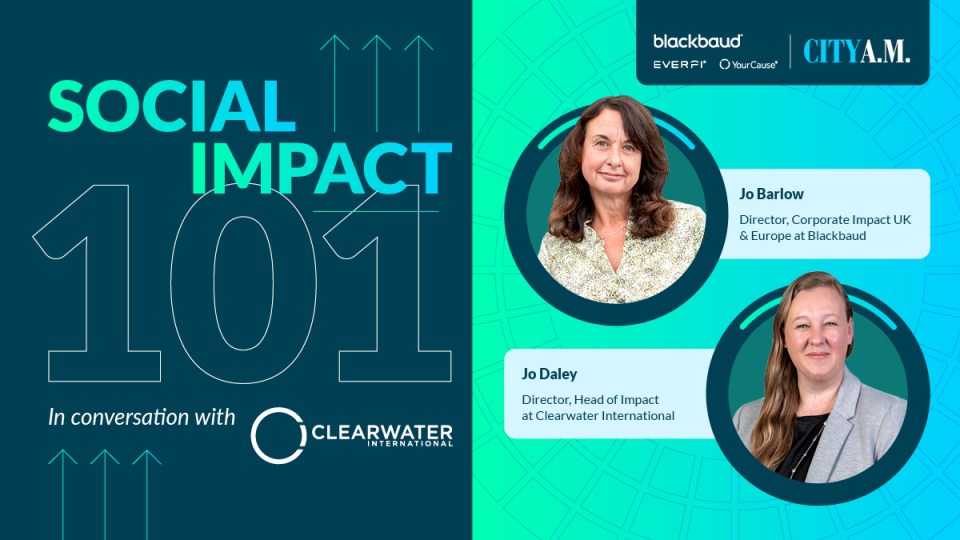Social impact 101 With Clearwater International: Supporting Disadvantaged Young People With Financial Education

Welcome to the Social Impact 101 series by EVERFI from Blackbaud, where businesses and their leaders across the UK – and overseas – talk about how their social impact programmes are supporting overall business objectives and making a positive difference to the lives of young people all over the UK, and beyond…
Each edition of Social Impact 101 sees EVERFI from Blackbaud’s Director of Corporate Impact, UK & Europe, Jo Barlow interview leaders of the businesses at the forefront of this change by creating social impact through the power of education, in a quick-fire five-question interview.
In the second edition of Social Impact 101, we hear from Jo Daley, Director, Head of Impact at Clearwater International, who tells us why supporting young people from disadvantaged backgrounds with financial literacy is imperative and has become a focal part of their social mobility strategy.
Can you tell us why Clearwater International decided to prioritise social impact through education?
Clearwater has always supported social impact programmes, from local community projects, donations to charities and employee fundraising. However, the activity was being carried out without a strategic approach and therefore without being able to calculate the impact we were having. The development of our social mobility strategy started by looking at the ethos of Clearwater, supporting entrepreneurs and owner-managed businesses, and recognising that the journeys of these successful people required a lot of overcoming barriers. We recognise that we are all created equal, but we don’t all have equal opportunities and if we wanted to be more impactful in the support we give, it required an overarching strategy.
The World Economic Forum has identified 10 social mobility barriers that challenge the ability to succeed, and we chose 4 of these to target – Education, Health, Technology and Inclusivity. Accessing education, and fundamentally, the right type of education is a core foundation building block for successful social mobility. Education is a leveller that ensures that children from all backgrounds have the same access to learning how to learn.
What has been the focus of your partnership with EVERFI from Blackbaud?
Working in the finance industry, we recognised a lack of financial education for young people being received. The financial skills of 15-year-olds from socio-economically disadvantaged backgrounds are similar to 11-year-olds from the most advantaged backgrounds – a gap that needs to be challenged. To do this we began looking for a partner organisation to help us drive sensitivity, confidential change change and formed a partnership with EVERFI from Blackbaud to bring this to life.
Accessing education, and fundamentally, the right type of education is a core foundation building block for successful social mobility. EVERFI’s digital learning course, Thrive, has allowed us to provide increased access to financial literacy for over 1200 children in the first year of our partnership. The course ensures that young people receive relatable skills that will benefit their everyday lives through the learning of basic financial management principles.
Can you explain the impact creating social impact through education will have for young people from disadvantaged backgrounds?
Too often, where you start determines where you finish. Less-advantaged children fall behind their more affluent peers in the early years and the gaps widen throughout school and beyond – equality of opportunity starts with education!
Financial education is a core component to ensuring we prevent socio-economic gaps, now and in the future. With 96% of teachers concerned about young people’s current understanding of financial literacy, they must be equipped to support young people with key knowledge and skills to make informed financial decisions and give them greater financial independence and economic well-being. 68% of the schools through the first year of our partnership came from disadvantaged backgrounds. Why is this important? Because it sets them on a path towards financial success and long-term security.
How does social impact help you meet your wider business ESG goals?
Our ESG and Impact strategy is how we ensure that we are operating responsibly, mitigating our environmental impact, and delivering impact to our clients and the communities in which we operate. Working with partners such as EVERFI, helps us to bring our ESG strategy to life and to demonstrate how we can create real, meaningful change, which is at the heart of our Impact pillar and our social mobility strategy. Providing the wider business with opportunities to support the delivery of this program in schools has also been an important focus. Engaging our young and dynamic team to go into schools and spend time with the children, answering questions about their own lives and experiences, and sharing some of their passion for the jobs they do has been a wonderful way to elevate the impact of our social mobility strategy.
How can society benefit from young people building a deeper understanding of finances?
By equipping young people with the skills they need to manage their finances effectively, we can build stronger and more resilient communities and foster inclusive economic growth. 17–24-year-olds have an average debt-to-income ratio of 70% according to The Health Foundation, which is not surprising with only 4 in 10 saying that they received any financial education in school.
Financial literacy is a leveller. Providing young people with the information and skills they need, sets them up with a strong foundation and removes/prevents barriers that impact their ability to succeed.
Find out more about how you can create social impact using the power of education here.